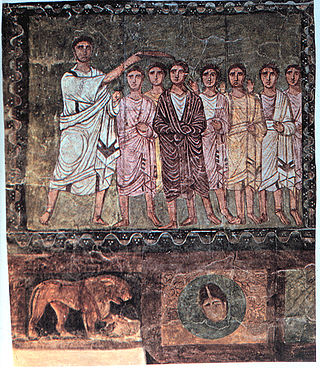
Christianity is an Abrahamic monotheistic religion based on the life and teachings of Jesus. It is the world's largest and most widespread religion with roughly 2.4 billion followers, comprising around 31.2% of the world population. Its adherents, known as Christians, are estimated to make up a majority of the population in 157 countries and territories. Christians believe that Jesus is the Son of God, whose coming as the Messiah was prophesied in the Hebrew Bible and chronicled in the New Testament.
Christianity began as a movement within Second Temple Judaism, but the two religions gradually diverged over the first few centuries of the Christian Era. Today, differences of opinion vary between denominations in both religions, but the most important distinction is Christian acceptance and Jewish non-acceptance of Jesus as the Messiah prophesied in the Hebrew Bible and Jewish tradition. Early Christianity distinguished itself by determining that observance of halakha was not necessary for non-Jewish converts to Christianity. Another major difference is the two religions' conceptions of God. The Christian God consists of three persons of one essence, with the doctrine of the incarnation of the Son in Jesus being of special importance. Judaism emphasizes the Oneness of God and rejects the Christian concept of God in human form. While Christianity recognizes the Hebrew Bible as part of its scriptural canon, Judaism does not recognize the Christian New Testament.

Judaism is an Abrahamic, monotheistic, and ethnic religion. It comprises the collective spiritual, cultural, and legal traditions of the Jewish people, having originated as an organized religion in the Middle East during the Bronze Age. Contemporary Judaism evolved from Yahwism, the cultic religious movement of ancient Israel and Judah, around the 6th/5th century BCE, and is thus considered to be one of the oldest monotheistic religions. Religious Jews regard Judaism as their means of observing the Mosaic covenant, which was established between God and the Israelites, their ancestors. Jewish religious doctrine encompasses a wide body of texts, practices, theological positions, and forms of organization.
The term Judeo-Christian is used to group Christianity and Judaism together, either in reference to Christianity's derivation from Judaism, Christianity's recognition of Jewish scripture to constitute the Old Testament of the Christian Bible, or values supposed to be shared by the two religions. The term 'Judæo Christian' first appeared in the 19th century as a word for Jewish converts to Christianity. The term has received much criticism, largely from Jewish thinkers, as relying on and perpetuating inherently antisemitic notions of supersessionism, as well as glossing over fundamental differences between Jewish and Christian thought, theology, culture and practice.

In Abrahamic religions, a messiah or messias is a saviour or liberator of a group of people. The concepts of mashiach, messianism, and of a Messianic Age originated in Judaism, and in the Hebrew Bible, in which a mashiach is a king or High Priest traditionally anointed with holy anointing oil.

Jews for Jesus is an international Christian missionary organization headquartered in San Francisco, California that is affiliated with the Messianic Jewish religious movement. The group is known for its proselytism of Jews and promotes the belief that Jesus is the Christ and the Son of God. It was founded in 1970 by Moishe Rosen as Hineni Ministries before being incorporated under its current name in 1973.

Messianic Judaism is a modernist and syncretic movement of Protestant Christianity that incorporates some elements of Judaism and other Jewish traditions into the Christian movement of evangelicalism.

The Messiah in Judaism is a savior and liberator figure in Jewish eschatology who is believed to be the future redeemer of the Jews. The concept of messianism originated in Judaism, and in the Hebrew Bible a messiah is a king or High Priest of Israel traditionally anointed with holy anointing oil. However, messiahs were not exclusively Jewish, as the Hebrew Bible refers to Cyrus the Great, Achaemenid Emperor, as a messiah for his decree to rebuild the Jerusalem Temple.
Many Wikipedia articles on religious topics are not yet listed on this page. If you cannot find the topic you are interested in on this page, it still may already exist; you can try to find it using the "Search" box. If you find that it exists, you can edit this page to add a link to it.
Christianity and other religions documents Christianity's relationship with other world religions, and the differences and similarities.
Most adherents of Judaism believe that Jesus of Nazareth was not the Messiah nor "the Son of God". In the Jewish perspective, most will argue that the way Christians see Jesus goes against monotheism, a belief in the absolute unity and singularity of God, which is central to Judaism; the worship of a person is seen by them as a form of idolatry. Therefore, considering Jesus a deity is forbidden according to Judaism. Judaism's rejection of Jesus as the Messiah is based on Jewish eschatology, which holds that the coming of the true Messiah will be associated with events that have not yet occurred, such as the rebuilding of The Temple, a Messianic Age of peace, and the ingathering of Jews to their homeland.
A number of religious groups, particularly Christians and Muslims, are involved in proselytization of Jews: Attempts to recruit or "missionize" Jews. In response, some Jewish groups have formed counter-missionary organizations to discourage missionary and messianic groups such as Jews for Jesus from using practices that they say are deceptive.
Messianism is the belief in the advent of a messiah who acts as the savior of a group of people. Messianism originated as a Zoroastrianism religious belief and followed to Abrahamic religions, but other religions have messianism-related concepts. Religions with a messiah concept include Judaism (Mashiach), Christianity (Christ), Islam, Druze faith, Zoroastrianism (Saoshyant), Buddhism (Maitreya), Taoism, and Bábism.

Most scholars who study the historical Jesus and early Christianity believe that the canonical gospels and the life of Jesus must be viewed within their historical and cultural context, rather than purely in terms of Christian orthodoxy. They look at Second Temple Judaism, the tensions, trends, and changes in the region under the influence of Hellenism and the Roman occupation, and the Jewish factions of the time, seeing Jesus as a Jew in this environment; and the written New Testament as arising from a period of oral gospel traditions after his death.

In Christianity, worship is the act of attributing reverent honour and homage to God. In the New Testament, various words are used to refer to the term worship. One is proskuneo which means to bow down to God or kings.
Religion in Israel is manifested primarily in Judaism, the ethnic religion of the Jewish people. The State of Israel declares itself as a "Jewish and democratic state" and is the only country in the world with a Jewish-majority population. Other faiths in the country include Islam, Christianity and the religion of the Druze people. Religion plays a central role in national and civil life, and almost all Israeli citizens are automatically registered as members of the state's 14 official religious communities, which exercise control over several matters of personal status, especially marriage. These recognized communities are Orthodox Judaism, Islam, the Druze faith, the Catholic Church, Greek Orthodox Church, Syriac Orthodox Church, Armenian Apostolic Church, Anglicanism, and the Baháʼí Faith.

The Hebrew Christian movement of the 19th and early 20th centuries consisted of Jews who converted to Christianity, but worshiped in congregations separate from denominational churches. In many cases, they retained some Jewish practices and liturgy, with the addition of readings from the Christian New Testament. The movement was incorporated into the parallel Messianic Jewish movement in the late 1960s.
This is a glossary of terms used in Christianity.

Christianity in the 1st century covers the formative history of Christianity from the start of the ministry of Jesus to the death of the last of the Twelve Apostles and is thus also known as the Apostolic Age. Early Christianity developed out of the eschatological ministry of Jesus. Subsequent to Jesus' death, his earliest followers formed an apocalyptic messianic Jewish sect during the late Second Temple period of the 1st century. Initially believing that Jesus' resurrection was the start of the end time, their beliefs soon changed in the expected Second Coming of Jesus and the start of God's Kingdom at a later point in time.
Second Temple Judaism is the Jewish religion as it developed during the Second Temple period, which began with the construction of the Second Temple around 516 BC and ended with the Roman siege of Jerusalem in 70 AD.








